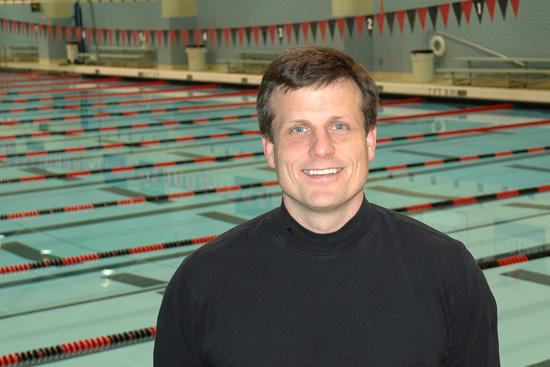Associate Director of Athletics Makes Time for All Sports
 |
| Richard Whitmore, associate director of Athletics, oversees the scheduling of all 15 Wesleyan athletic facilities, including the Wesleyan Natatorium. |
| Posted 01/17/07 |
| On any given day, there are 29 athletic teams, 10 intramural sports, several sport-related clubs or Wesleyan employees all vying for a rink, court, pool or field to use for practice or play.
It is the job of Richard Whitmore, associate director of Athletics, to schedule Wesleyans athletic facilities with those who need them. And when occupied, he insures the venue is safe, secure and teams are equipped properly. Half of my job is working with people to schedule the facilities, but I also spend a lot of time coordinating the games and making sure everyone has everything they need prior to their game, meet or match, Whitmore says. Theres always something new happening, and that makes working in this field very exciting. Whitmore meets with at least a dozen Wesleyan coaches every day, and interacts with numerous students who drop by, e-mail or call in facility requests. He attends most home-games, of every sport, to make sure the athletes have everything they require for the event. Preparing the fields with proper markings, fencing and seating also is completed under his supervision. Being able to watch a little bit of every home game is a great benefit to this position, Whitmore says. Whitmore came to Wesleyan in 1999 as the athletic facility manager. He later took on the role of managing the 1,500-seat Spurrier-Snyder Rink, which is occupied 18 hours a day between October and March. Nowadays, he oversees all 15 facilities, including the Macomber Boathouse, Rosenbaum Squash Center, the John Wood Memorial Tennis Courts, Bacon Field House and the new Smith Field for field hockey, soccer and lacrosse. Wesleyan is extremely fortunate to have Richard as a member of the Department of Physical Education administrative staff, says John Biddiscombe, director of Athletics and chair of the Physical Education Department. He has an outstanding background as a Ivy League student athlete, a successful college head coach and athletic administrator. Also, his user friendly management style is appreciated by the students, faculty and staff and the smooth operation of the athletic facilities is a direct result of his efforts. Whitmore also helped with the planning of the Freeman Athletic Center addition. Prior to its opening in January 2005, hed have to manage the athletic affairs in the old Fayerweather Gymnasium and the former Alumni Athletic Building. Its so great to have everything under one roof now, Whitmore explains. It not only makes managing these facilities much easier, but its good for our student athletes and spectators alike. Now we can have a hockey game, an indoor track meet and swim meet all going on at the same time, in the same building, and this gives visitors a real sense of what our athletic program is all about. In addition, Whitmore says the new athletic center offers facilities equivalent or better than other liberal arts colleges in the area. Its not only Wesleyan coaches and athletes who seek space in the Freeman Athletic Center. University Relations has requested rooms during graduation. Middlesex Youth Hockey has its base of operations out of the Spurrier-Snyder Rink, and area high schools use the Andersen Track for their competitions. Whitmore, along with Kate Mullen, head coach of womens basketball, and Kirsten Carlson, administrative assistant, use the campus-wide program Scheduler-Plus to keep track of spaces being used at certain times. It can be challenging to stay on top of things, but somehow we manage to do so, Whitmore says. Whitmore, a native of Waterville, Maine, is a former basketball, baseball and football player himself. His father, Dick Whitmore, has coached Colby Colleges mens basketball team for 38 years, and served as athletic director from 1986-2003. Richard Whitmore attended Brown University, graduating with a Bachelors of Arts in American civilization in 1990. During his junior year, he tore a ligament in his knee during the basketball season, ending his career. Nevertheless, a teammate wrote the NBA, requesting that Whitmore be considered as a candidate for the draft under the provisions of the Hardship Rule. No one else from an Ivy League school had made it into the NBA draft as a Hardship candidate before, Whitmore says, smiling. I sure got a lot of local press from that one. Like his father, he decided to take a coaching career path starting at Daniel Webster College as a basketball and baseball coach. He also worked as a sports information director. In 1996, he moved to Kenyon College in Ohio, also to coach basketball and baseball. Coaching was a fun part of my life, and I enjoyed working with the students one-on-one, but I also enjoy the administrative side of sports, Whitmore says. I am glad to be doing what I do now. |
| By Olivia Drake, The Wesleyan Connection editor |

